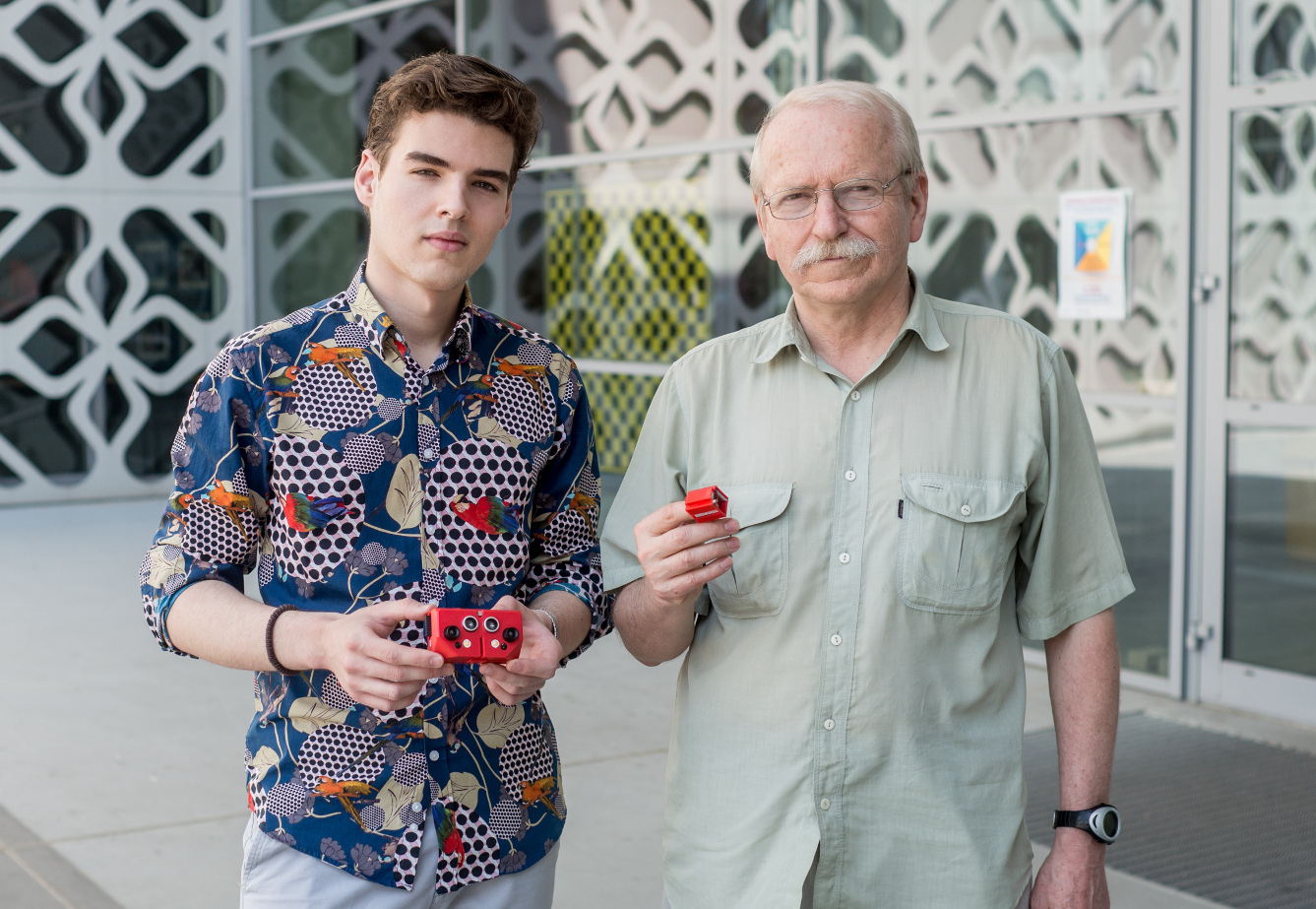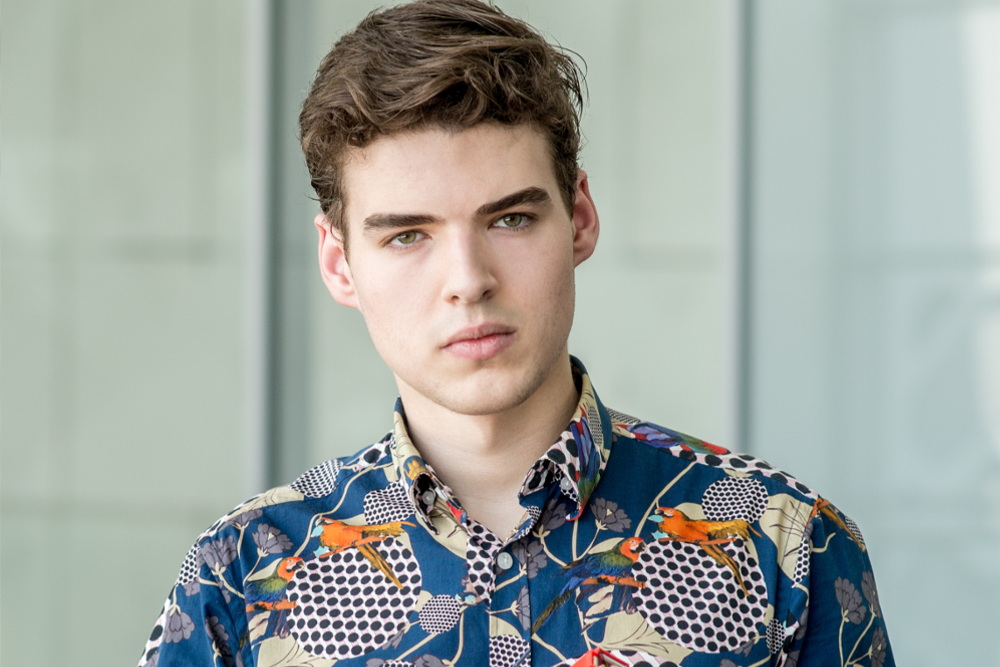A box full of sounds. This young inventor could change the lives of millions of blind people [Forbes]

for: Forbes.com
A student of the Bialystok University of Technology is working on a device that can completely change the situation of blind people. MATIA registers the environment around it, and using artificial intelligence, recognizes objects and makes correlations between them, creating a narrative for a disabled person – telling her where obstacles are and what is happening around her. The potential for this device is huge.
The development of new technologies is increasingly focusing on helping the ailing or disabled in realizing the most human of needs. They are not only for the blind. Special exoskeletons called Re-Walk are helping people paralyzed from the waist down in restoring their mobility. The Talkitt application, which can be installed on a smartphone, tablet or computer, can speak for those who suffer from a speech impairment, recognizing the sounds produced by the speaker and translating them into easy-to-understand words.
Technologies servicing the blind
A hundred years ago there weren't even walking sticks for the blind. Now there is a special technology based on Braille, called Ergonomic Motion Detection, that has been developed with such people in mind, making it possible to precisely write on a touch screen without even looking at it. Researchers have also created an artificial retina called the Nano Retina for implantation into the eye of a person who has lost their sight, restoring partial vision. The procedure lasts an hour.
This latest technology was developed by a team from Israel, where perhaps the largest number of such inventions are created. In Poland there are also talented people working to change the quality of life for people with disabilities.
“Matia is Greek for eyes”, explains 22-year-old Petros Psyllos, a Bialystok University of Technology student, who was born on the Greek island of Chios. The device which he has developed is intended to act as a guide for blind people. “It's small, so it can be clipped onto a shirt or put into your pocket. Its task, in turn, is creating a real-time description of what is around you. It can help not only the visually impaired, but also people with Alzheimer's or senile dementia”, says Psyllos.
According to data from the Central Statistical Office, there are approximately 1,800,000 visually impaired people living in Poland – and these people are to some extent excluded from social life. Often they need help to function normally. This assistance can be provided by a device developed at the University of Technology in Bialystok.
Matia uses audio-description, or words and sounds to create a narrative; a blind person receives direct signals about the various elements of their environment so they can safely move around the city.
“A blind man walks down the street and does not know where potential obstacles are. Matia says, “Careful user, on the left side is a pole or a trash can, on the right is a car, and in front of you there is a pedestrian crossing, be careful not to walk into the street”, explains the young inventor.
Artificial intelligence as a guide to the world
How is it that a small device can create this type of description of reality? Matia is equipped with cameras that record its surroundings. The image is transmitted to a mobile phone, and artificial intelligence recognizes correlations between objects. The database of the device holds approximately one thousand such items and possible events, but when combined with the cloud – this number rises to 49 million. This allows users to identify and predict the majority of situations that can happen to them in everyday life.
One of the biggest challenges in the development of this technology is in-depth knowledge of the needs of the target group. For people with healthy eyes it is difficult to fully understand how it is to function in the world without seeing it.
“What for us seems quite obvious, for a blind person may be completely alien. It turns out that as the eyes cease to function, the part of the brain which processes information from the eyes begins to process auditory information – therefore the blind can hear more; you can metaphorically say that they see with sound”, says Psyllos.
Interestingly, Matia will not only use words to describe what is in its environment. Items and various obstacles are assigned sounds – and so, for example, the pole may sound like an electric guitar. Verbal sequences are replaced with melodies, and the idea behind this is to provide the ability to be able to respond quickly to the surroundings. By having a sound associated with specific events or objects, you do not have to listen to a long description. This way you can completely replace the word or merge with another one. The possibilities for configuration and personalization are many.
Not only a scientific challenge, but a business one as well
The potential is huge and investors see it. The twenty two year-old has already had several conversations with organizations and individuals interested in participating in the development and sales of the device. However, he has not accepted any offers yet- he was discouraged by the long-term contracts and unfavorable ratios of equity. The problem is that the market is still unexplored and difficult, so that on the one hand investors want to have their input, and the other – see risk.
When asked about obstacles, Psyllos explained that the official number of blind people is greatly inflated, mainly because of false information provided by various criminal groups. The majority of visually impaired people are older, who are less likely to use new technology than younger disabled people. A way to reach them has to be found. It seems worth giving it a try.
“The market is difficult to estimate, but we know that the problem is growing. With an aging population, there are more and more people who see poorly. It is estimated that in ten years, in the European Union, every fourth person will have serious vision problems”, says the inventor.
The development of a specific business model for Matia is one of the main objectives of the Bialystok University of Technology student – but not something with which he intends to hurry. He notes that the prototype still needs work and, above all, there need to be further tests involving the blind. Added to this is another question. Psyllos admits that he is still quite young and has no experience in business – that's why he wants to enter the business world slowly, and tread carefully.
One thing is for sure, and that is that we haven't heard the last of Psyllos. His portfolio is already bursting at the seams with awards won in contests and competitions. Recently, he received an award as one of the leading Polish innovators at the prestigious MIT Technology Review for the creation of "an eye for the blind." This was not his first invention (he previously developed a glove that helps mute people communicate), but MATIA is by far his most advanced invention, and has the greatest business potential.
source: http://pierwszymilion.forbes.pl/matia-wynalazek-dla-niewidomych,artykuly,205947,1,2.html

